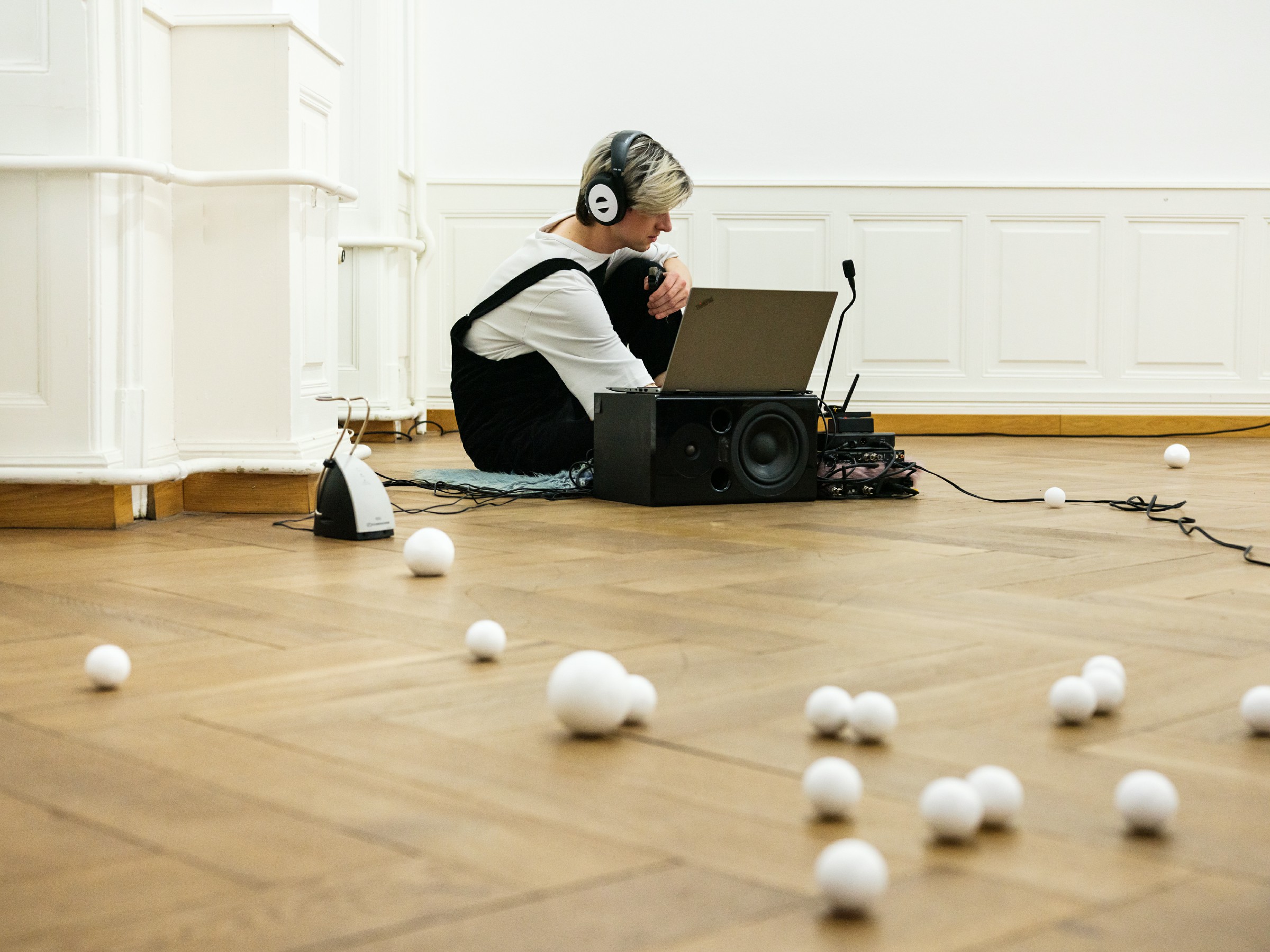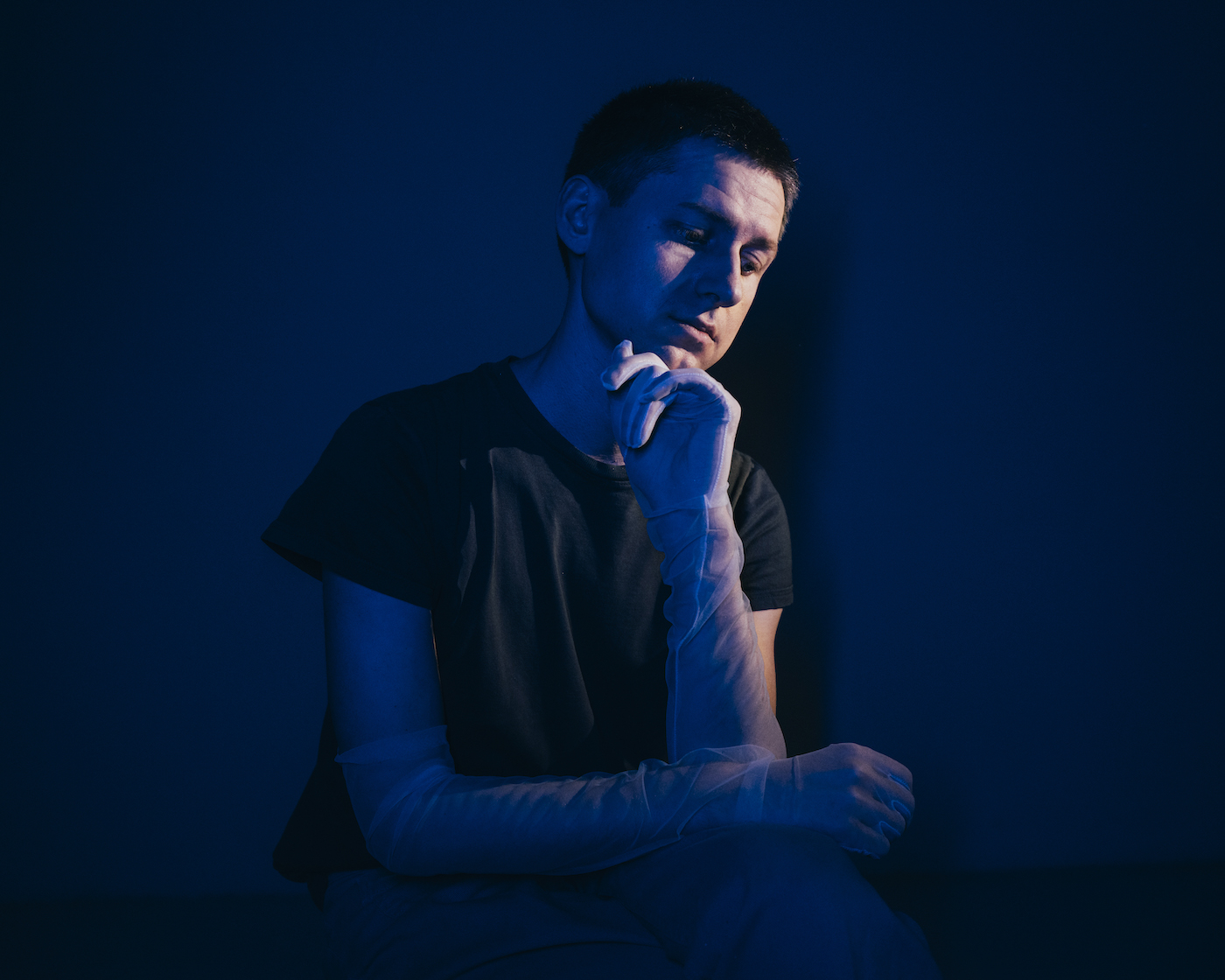Friedemann Dupelius
“Which machine would you like to have dinner with (smartphones don’t count)?” – Leo Hofmann ponders and decides on a rolling, self-playing piano on which he can also play himself sometime.
The relationships between humans and machines, or, to put it more trendily: between human and non-human performers, are currently a popular topic in art and debate, not least triggered by the latest hype regarding artificial intelligence. In their music theatre piece All watched over by machines of loving grace composer Leo Hofmann and director Benjamin van Bebber deal with these relations in intimate stage situations. In 1967, Richard Brautigan wrote of a „cybernetic meadow / where mammals and computers / live together in mutually / programming harmony“ in his poem of the same name

The utopia Brautigan describes originates from the hippie era. The counter-movements of the 60s saw in the emerging computer technology a revolutionary, humanistic potential for a better world. Even the founding of the first companies in Silicon Valley can be traced back to this. In the old days.
After a corona-induced film premiere of All watched over…. in 2021, the piece celebrated its premiere in physical co-presence at the Roxy Birsfelden in May. In June, the mixed choir reunites for two performances at Berlin’s Ballhaus Ost.
Film: All watched over by machines of loving grace
Human and non-human musical entities
All watched over…. is about how 21st century technologies are affecting the way we live together. In particular, regarding sound. How can we act responsibly in the midst of omnipresent constant sound? Where can space for intimacy be created? What is it with machines and us? The “extremely mixed choir”, which Hofmann and van Bebber founded for another project, represents the human part of the actors on stage. Extremely mixed means that it features professionals as well as so-called amateurs with the most diverse backgrounds. In addition, there are non-human devices, such as loudspeakers. Here a specific feature of Hofmann’s and van Bebber’s work becomes apparent. “I am an electronic composer and see matters from a radio play and loudspeaker point of view,” says Hofmann. “When you work with finished music, it creates a new freedom on stage and raises the question of co-presence in the production.”
In this regard, Hofmann and van Bebber have invented the term “complementary action”. What do liberated bodies do when the music comes out of the loudspeaker and does not have to be actually performed? The performers become co-present mediators of the music and can draw attention to certain musical details through small actions and gestures. The music theatre makers find another concept in the principle of “ritournelle” by philosophers Gilles Deleuze and Félix Guattari. This opens up the option of creating one’s own acoustic space for action, for example by a performer establishing an inner sense of security through quiet humming or murmuring, which the choir in All watched over…. can use as a starting point for improvisation and act upon. Leo Hofmann likes to speak of a listening space into which the performers and the audience enter together, thus creating a “shared attention”.
Leo Hofmann: Ritournelle
Hospitality in the music household
The duo will also set up such a listening room in July during the Nuremberg music installations. The festival which takes place for the first, wants to explore the space as a central element in experiencing music – in deliberate distinction to forms such as sound installation, music theatre or concert. Leo Hofmann interprets the guideline as follows: “To me, this is a promise that music will be produced ongoingly by acting bodies, but those are not stable.” But couldn’t a bar counter with background music and the right framing be called a music installation? Anyway, in Hofmann’s and van Bebber’s case the music is played live. During the four days of the festival, they will settle in the collective space of the Nuremberg band Borgo and have various musicians as guests. “We want to negotiate hospitality on different levels. It will not be a performance, nor a total space, but we will live, sleep and eat in this space for four days, make a daily programme and the guest musicians will bring what they already have,” says Leo Hofmann. Composer-performer Francesca Fargion, for example, composes sleep songs and works with stylized diaries. A visit to Hofmann/van Bebber is supposed to function like a house call. In contrast to sound installations that often run on their own, this musical household is only activated by its inhabitants and guests, with the audience of course also being invited into this space of shared attention.
Leo Hofmann: Kapriole, released 2022 by Präsens Editionen
Intimate leaps
Leo Hofmann immortalised a different kind of staged listening space on vinyl record in the spring of 2022. Although the Bern University of the Arts graduate has been primarily active with music theatre productions in recent years, he had already produced radio plays and music much earlier. Kapriole (leap) is nevertheless his first “real” album, released by the busy Lucerne label Präsens Editionen. Spread over eight tracks, Leo Hofmann shows his interpretation of contemporary sound practices. In his live pieces, he often deals with functional audio technologies, such as Bluetooth boxes. Above all, he is interested in their aesthetic and social significance – what listening, protective and private spaces does contemporary audio technology open up?

The music on Kapriole sounds intimate and close, also through the careful use of the voice, which sometimes seems as if it were singing or speaking only to the listener. Hofmann says that the biggest challenge has been to create space in the listening room. “I often hear that my music is very dense and requires a lot of attention. When working on the album, I kept de-densifying, taking away and leaving sounds in the background. But you should also be able to listen at any time and discover something.” Whether in divided attention in front of the music theatre stage or on the inner stage between two earplugs: In Leo Hofmann’s listening rooms, one can feel at ease.
Friedemann Dupelius
11.+12. June, Ballhaus Ost, Berlin: Leo Hofmann & Benjamin van Bebber: All watched over by machines of loving grace
Interview with Hofmann/van Bebber on All watched over… (in German)
7.-10. July: Musikinstallationen Nuremberg – Festival for Space Time Body Musics
Leo Hofmann, Benjamin van Bebber, Präsens Editionen, Richard Brautigan, Gilles Deleuze, Félix Guattari
neo-Profil: Leo Hofmann

